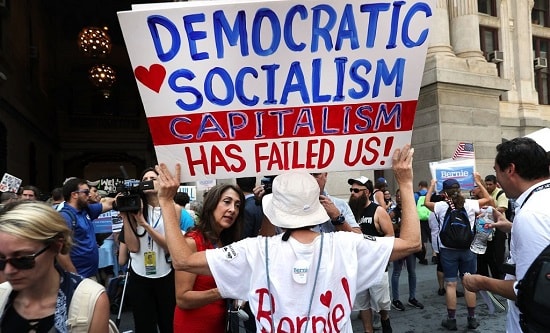
The US midterm elections on 6 November had the highest voter turnout (49.3%) for midterms since 1914 – and the highest ever campaign spending at $5.2bn. These elections are for members of Congress as well as state governors and other local officials. President Donald Trump had staked himself on Republican victory, encouraging voters to pretend that his name was on the ballot paper. Holding rallies across the country, Trump flouted traditional norms against a sitting President making partisan attacks and endorsements during midterm elections. His domineering tactics did not pay off. Though the Republicans slightly expanded their control of the Senate, the Democrats won control of the House of Representatives, gaining at least 39 seats. These included members of the Democratic Socialists of America (DSA), a reformist group seeking to drag the Democrats left, in particular towards supporting a universal healthcare system. WILL HARNEY reports.
Medicare for All
The US has the most expensive healthcare system in the world (18% of GDP) while ranking bottom in terms of performance compared to health systems in the other rich nations; and according the National Health Interview Survey January-June 2018, among adults in the US aged 18-64, 25.9% of those who were poor, 25% of those who were near poor and 7.6% of those who were not poor had no health coverage.
On 19 July 2018, Democrats in Congress launched the ‘Medicare for All’ (M4A) caucus with 70 founding members, to promote a universal healthcare system with a similar function to the NHS. Medicare is a government programme that covers about half of healthcare charges for over-65s and certain other eligible people who have paid into the system through taxes. M4A would extend this form of provision to the whole population, effectively a universal healthcare system, though the details are not yet agreed upon by backers of the legislation.
A key force behind M4A is the DSA. Since Trump’s election in November 2016, the DSA’s membership has surged from 5,000 to 50,000, and the number of local chapters has grown from 40 to over 180. At least 46 Democratic Socialist members were nominated for the midterm elections, of which 14 were endorsed by the national DSA (Axios.com, 14 September). The possibility of more M4A-supporting Democrats filling seats in Congress prompted the White House Council of Economic Advisers (CEA) to publish a report on 23 October titled ‘The Opportunity Costs of Socialism’, a 70-page attack on all things vaguely socialist – from Cuba and the USSR, to Scandinavian social democracy, to Medicare for All.
Despite the White House’s best efforts, the DSA saw two of its members, as well as a number of other candidates it endorsed due to their support for M4A, elected to Congress in the midterms on 6 November. The result will be a boost to the number of co-sponsors for the M4A bill; an extra 21 M4A-supporting Democrats were newly elected to Congress, adding to the 100+ who were re-elected (Slate, 5 November). Winners included Alexandria Ocasio-Cortez for New York and Rashida Tlaib for Michigan, both members of the DSA.
Opportunism
The election of self-identifying socialists in the midterms is an encouraging sign. However, it would be naïve to regard the DSA as a real force for social revolution. Ocasio-Cortez is lauded as a working-class hero taking on corporate power – though both she and Tlaib have been rightly criticised for their lukewarm support for Palestine. Ocasio-Cortez was the subject of a 24 July open letter by DSA members calling on the national organisation to rescind its endorsement if she failed to make a firm commitment to Palestinian liberation. On 10 August the DSA published an op-ed defending their endorsement, arguing ‘Palestine is not an excuse for bad strategy’. Tlaib (a Palestinian-American) was the subject of an Electronic Intifada (9 August 2018) expose on her receipt of $3,000 campaign funding by Israeli lobby group J Street, raising questions about her commitment to the Boycott, Divestment and Sanctions movement against Israel, which the DSA officially supports; on 15 August Tlaib clarified she ‘stands by the rights of people to support’ BDS movement against Israel, forcing J Street to withdraw its endorsement.
Trump threatens to push certain demographics towards revolutionary politics, especially young, black and Latino/a people. A YouGov poll in September-October 2017 found that 51% of those aged 21-29 in the US would prefer socialism over capitalism. The DSA recognise this and hope to marshal these forces back towards the Democrats, while leveraging support for reforms like universal healthcare. These reformists would find much to agree with in the CEA’s anti-socialist report; in their own words, the DSA ‘applaud the democratic revolutions that have transformed the former Communist bloc’ and ‘support organic Cuban dissident and reform movements that are working to democratize the country’. As class conflict intensifies, it remains to be seen whether structures like the DSA can fully contain the revolutionary tendencies of the working class.
Gerrymandering in Georgia
One race in particular illustrated the obstacles which are still stacked against the black working class in the US’s bourgeois democracy. Contesting the incumbent Republican Brian Kemp for the governorship of Georgia, if elected Democrat Stacey Abrams would have been the first black person to govern the state (where the population is 30.5% black). But Kemp worked to suppress black voters: thousands of Georgians had their registrations suspended; many had their IDs rejected by poll station staff; absentee ballots were rejected due to minor errors; hundreds of polling stations were closed before the election; hours-long queues ruled out participation for many workers (Mother Jones, 16 November 2018). with 4 million votes cast, Kemp won by 55,000. Abrams reacted, ‘Let’s be clear, this is not a speech of concession, because concession means to acknowledge an action is right, true or proper… As a woman of conscience and faith, I cannot concede that. But my assessment is the law currently allows no further, viable remedy.’




